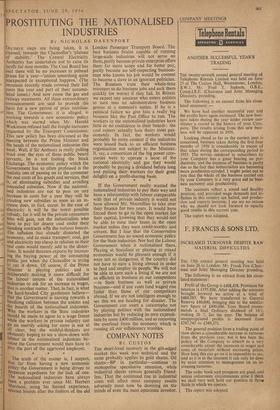PROSTITUTING THE NATIONALISED COMPANY MEETINGS
INDUSTRIES
BY NICHOLAS
DAVENPORT
Dt.cisivr. steps are being taken, it is claimed, towards the Chancellor's 'plateau of stability.' The Central Electricity Authority has undertaken not to raise its tariffs for nine months. The Coal Board has said there will be no increases in pithead prices for a year—'unless something quite unexpected or exceptional happens.' (The increases recently made covered their full costs this year and part of their accumu- lated losses.) And now come the gas and railway statements. All these extraordinary announcements are said to provide the basis for a new period of price stabilisa- tion. The Government, it is alleged, is Working towards a new economic policy Which was started when Mr. Harold Watkinson refused half the freight increases requested by the Transport Commission. This new policy has been discussed at the meeting between the Prime Minister and the heads of the nationalised industries this week. Well, if Sir Anthony is really pulling Wool over the eyes of these public board servants, he is not fooling the Stock Exchange. The economic policy which the Government has so often professed is the realistic one of passing on to the consumer the real costs of his goods and services, that is, of eliminating subsidies and avoiding concealed subsidies. Now if the national- ised industries are not to pass on any increase in costs for a year they will be creating new subsidies as soon as an in- crease does, in fact, occur. In the case of electricity it will be the worst possible subsidy, for it will be the private consumers Who will gain, not the industrialists who have to pay for dearer coal under their standing contracts wI'th the various boards. The inflation has already distorted the economy, and to make transport, coal, gas` and electricity too cheap in relation to their real costs would merely add to the distor- tions. It would threaten exports by increas- ing the buying power of the consuming Public just when the Chancellor is trying to cut it down. Of course, if the Prime Minister is playing politics and is deliberately making it more difficult for the labour unions of the nationalised industries to ask for an increase in wages, that is another matter. That, in fact, is what the hard-headed City gentlemen believe— that the Government is moving towards a headlong collision between the unions and the boards of the nationalised industries. Why the workers in the State industries should be made to agree to a wage freeze while the workers in private industry can go on merrily asking for more is not at all clear, but the wishful-thinkers are obviously hoping to see a show-down with labour in the nationalised industries be- cause the Government would then have to Play the part of the aggrieved employer.
* *
The truth of the matter is, I suspect, that far from having a new economic Policy the Government is being driven to desperate expedients for the lack of one. The nationalised industries have always been a problem ever since Mr. Herbert Morrison, using his limited experience, created boards after the fashion of the old London Passenger Transport Board. The best business brains capable of running large-scale industries will not serve on them, partly because private enterprise offers them far more scope and far better pay, partly because no self-respecting business- man who knows his job would be content to become a slave to an ignorant politician. The Russians train their whole-time ministers to do business jobs and sack them quickly (or worse) if they fail. In Britain we expect any amateur who enters politics to turn into an administrative business genius at a moment's notice. If he is a political failure we give him a really big business like the Post Office to run. The workers in the nationalised industries have little or no confidence in their boards: the coal miners actually hate theirs most pas- sionately. In fact, the workers would probably be more content if the industries were leased back to an efficient business organisation not subject to the Minister. If, say, a consortium of the big power com- panies were to operate a lease of the national electricity and gas they would probably be paying a dividend before long and putting their workers (to their great
delight) on a profit-sharing basis.
* *
If the Government really wanted the nationalised industries to pay their way and have a relationship with labour comparable with that of private industry it would not have allowed Mr. Macmillan to take over their finance for two years. It would have forced them to go to the open market for their capital, knowing that they would not be able to raise their loans in the open market unless they were credit-worthy and solvent. But I fear that the Conservative Government has no sound economic policy for the State industries. Nor had the Labour Government when it nationalised them. Playing at Socialism or playing at mixed economies would be pleasant enough if it were not so dangerous, if the country did not have to earn a living abroad in order to feed and employ its people. We will not be able to earn such a living if we are not as efficient in business as our competitors —in State business as well as private business—and if our costs (and wages) rise faster than those of our competitors abroad. if we are not intelligent enough to see this we are heading for disaster. The Government can avert a catastrophe not by playing politics with the nationalised industries but by reducing its own expendi- ture by some £400 million, and so removing the overload from the economy which is causing all our inflationary troubles.


































 Previous page
Previous page